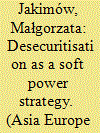| Srl | Item |
| 1 |
ID:
169129


|
|
|
|
|
| Summary/Abstract |
While much discussion centres on economic properties and political challenges of implementing the China’s Belt and Road Initiative (BRI), few studies investigate the subtle connections between the narratives of the BRI and the political transformations in the regions en route of the project. Through a critique of the Copenhagen School’s theory of securitisation, this paper brings together the analysis of Chinese, Central-Eastern European (CEE) and the core EU governments’ ideas and perceptions of the BRI and assesses what they mean for the future of the European Union’s political and normative cohesion. This paper argues that the China-deployed desecuritised narratives of the BRI constitute an important soft power strategy of China in its engagement in Europe. The article illustrates how these desecuritised narratives are utilised and co-produced actively by countries of CEE with a political aim of negotiating their domestic interests with the EU’s institutions, making the process of desecuritisation neither apolitical nor benign. As China-promoted desecuritisation is used instrumentally by the regional actors to present China as an economic, political and normative alternative to the EU, the article contributes to the understanding of China’s desecuritisation as a soft power strategy, which is both forged through ‘negative’ language (Callahan, Politics 35(3–4):216–229, 2015) and is ‘contingent’ upon recipient audiences (Kavalski, Coop Confl 48(2):247–267, 2013). As a result, new regional dynamics emerge in the EU, which are driven by the populist turn and growing demand for Chinese investments in the European periphery, which China skilfully utilises through narratives of desecuritisation in order to boost its soft power strategy in the region.
|
|
|
|
|
|
|
|
|
|
|
|
|
|
|
|
| 2 |
ID:
156263


|
|
|
|
|
| Summary/Abstract |
Based on ethnographic fieldwork among migrant worker NGOs conducted between 2011 and 2016, this article employs critical theories of citizenship to illustrate how migrant worker NGOs use a strategy of ‘resistance through accommodation’ to re-shape the citizenship regime and discourse in China. The dominant literature on labour activism tends to discount the potential for migrant worker NGOs to undertake resistance, on account of their dependency upon the state and the market. The article contends that while NGOs must engage in relations with the state and the market to ensure their own survival, their activism does not ultimately centre on either resisting or accommodating these actors directly, but rather upon a broader engagement process aimed at the strategic purpose of ‘citizenship transformation’.
|
|
|
|
|
|
|
|
|
|
|
|
|
|
|
|